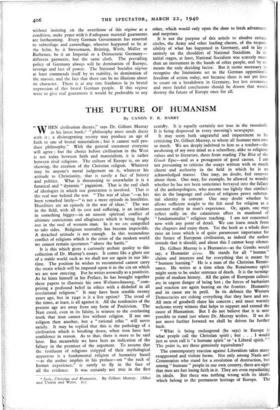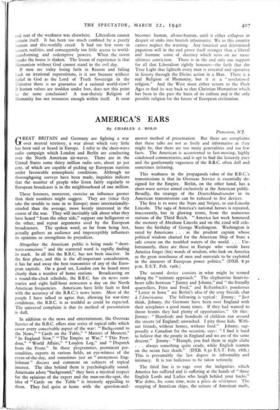THE FUTURE OF HUMANISM
By CANON F. R. BARRY
WHEN civilisation decays," says Dr. Gilbert Murray in his latest book,' " philosophy must needs decay with it ; a disintegrating society may produce an age of faith or one of brutal materialism ; but it cannot well pro- duce philosophy." With the general statement everyone will agree ; but the choice before civilisation in the West is not today between faith and materialism, it is rather between rival religions. The culture of Europe is, on any showing, the creation of the Christian religion. Whatever may be anyone's moral judgement on it, whatever his attitude to Christianity, that is surely a fact of history and politics. What is threatening to overwhelm it is a fanatical and " dynamic " paganism. That is the real clash of ideologies in which our generation is involved. That is the real war behind the war. " The war of ideas "—as has been remarked lately—" is not a mere episode in hostilities. Hostilities are an episode in the war of ideas." The war in the field, with all its cost and suffering, is an incident in something bigger—in an unseen spiritual conflict of ultimate convictions and allegiances which is being fought out in the soul of western man. In it we are compelled to take sides. Religious neutrality has become impossible. A detached attitude is not enough. In this tremendous conflict of religions which is the crisis of the modern world we cannot remain spectators " above the battle."
It is this which gives a curiously archaic quality to this collection of Dr. Murray's essays. It comes like a ghost out of a stable world such as we shall not see again in our life- time. The position he wishes to recommend cannot carry the strain which will be imposed upon it in the era on which we are now entering. For he writes avowedly as a positivist. As he hints himself in his Preface, he has brought together these papers to illustrate his own Weltanschauung, " com- prising a profound belief in ethics with a disbelief in all revelational religions." It may have been tenable twenty years ago, but in 1940 is it a live option? The trend of the times, at least, is all against it. All the tendencies of the present age are away from any form of Positivism. The Nazi creed, even in its falsity, is witness to the everlasting truth that man cannot live without religion. If not one religion then another, but a " rational ethic " will never satisfy. It may be replied that this is the pathology of a civilisation which is breaking down, when men have lost confidence in reason. As to that, there is more to be said later. But meanwhile we have here an indication of the fallacy in the premises of the argument. To assume that the residuum of religions stripped of their mythological apparatus is a fundamental religion of humanity based —as the author implies in his preface—on " the rock of human experience," is surely to fly in the face of all the evidence. It was certainly not true in the first
* Stoic, Christian and Humanist. By Gilbert Murray. (Allen and Unwin and Watts. 5s.)
centuty. It is equally certainly not true in the twentieth. It is being disproved in every morning's newspaper.
It may seem both ungrateful and impertinent to be criticising Dr. Gilbert Murray, to whom all humane men owe so much. We are deeply indebted to him as a teacher—the awakening of my own mind as a schoolboy, alike to religious values and to literature, dates from reading The Rise of the Greek Epic—and as a protagonist of good causes. I am not presuming to criticise the essays written with so much charm and authority in the field in which he is an acknowledged master. One may, no doubt, feel reserves about them. One may, for example, be allowed to wonder whether he has not been sometimes betrayed into the fallacy of the anthropologists, who assume too lightly that similari- ties in the language and cultus of religions prove substan- tial identity in content. One may doubt whether he allows sufficient weight to the felt need for religion as a constant reality in man's experience. Or, again, one may reflect sadly on the calamitous effect in manhood of " fundamentalist " religious teaching. I am not concerned now with any point of detail. We can learn much from the chapters and enjoy them. Yet the book as a whole does raise an issue which is of quite paramount importance for the future of European civilisation, as indeed the author intends that it should; and about this I cannot keep silence.
Dr. Gilbert Murray is a Humanist—as the Greeks would say, a Humanist y6,63-Ei. He stands for all " human " claims and interests and for everything that is meant by " humane learning." He is a man of the Christian Renais- sance. He writes at a time when the Renaissance spirit might seem to be under sentence of death. It is the turning- point of modern history. All the gains of European culture are in urgent danger of being lost ; the forces of barbarism and reaction are again beating on the frontier. Humanity and its cause are in peril. In its defence the Western Democracies are risking everything that they have and are. All men of goodwill share his concern ; and must warmly welcome every witness that helps to support and extend the cause of Humanism. But I do not believe that it is now possible to stand just where Dr. Murray wishes. If we do not move further forward we shall be driven far further back.
" What is being endangered (he says) in Europe is what people call the Christian spirit ; but . . . I would just as soon call it ' a humane spirit' or ' a Liberal spirit. " The point is, are these genuinely equivalents?
The contemporary reaction against Liberalism takes many exaggerated and violent forms. Not only among Nazis and Communists who stand for a revolution of destruction, but among " humane " people in our own country, there are signs that men are fast losing faith in it. They are even repudiating its ideals. But there was nothing wrong with its ideals, which belong to the permanent heritage of Europe. The real seat of the weakness was elsewhere. Liberalism cannot sustain itself. It has been too much confined by a purely human and this-worldly creed. It had too few roots in unseen realities, and consequently too little access to world- transforming and redemptive powers. When the storm breaks the house is shaken. The lesson of experience is that Humanism without God cannot stand in the evil day.
If men are today losing faith in Reason and falling back on irrational superstitions, is it not because without belief in God as the Lord of Truth Sovereign in the Universe there is no guarantee of a rational world-view? If human values are trodden under foot, does not this point to the same conclusion? A non-theistic Religion of Humanity has not resources enough within itself. It soon becomes human, all-too-human, until it either collapses in despair or sinks into brutish inhumanity. We in this country cannot neglect the warning. Any fanatical and determined paganism will in the end prove itself stronger than a liberal and humane sense of decency which rests on no more ultimate conviction. There is in the end only one support for all that Liberalism rightly honours—the faith that the True Light that lighteth every man is revealed and operative in history through the Divine action in a Man. There is a real Religion of Humanity, but it is a " revelational religion." And the West must either return to the Dark Ages or find its way back to that Christian Humanism which has been in the past the basis of its culture and is the only possible religion for the future of European civilisation.







































 Previous page
Previous page